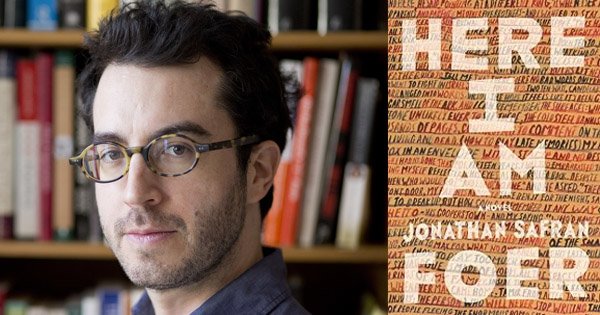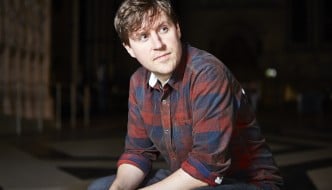Jeanette Winterson in conversation with Jonathan Safran Foer @ McrLitFest 2016
October 16, 2016

It could not have been more appropriate to have Jeanette Winterson interviewing Jonathan Safran Foer, since both primarily write fiction with a philosophical and religious tinge. Winterson’s work is filled with honest discussions of her rebellion against conventionality and Christianity, and Safran Foer’s with ethical dilemmas, religious questions, and the exploration of his own cultural American-Jewish identity. This is what made for such an engaging interview. The discussion that took place was heavily based on Safran Foer’s new book Here I Am, but due to this book’s incorporation of dilemmas from all fields, the discussion went a lot deeper than merely the art of writing.
His first novel in eleven years, Here I Am is a semi-autobiographical novel that follows the tragic breakdown of Jacob and Julia Bloch’s marriage. Alongside this storyline are all sorts of family issues and much larger political ones, including an earthquake in the Middle East causing an Arab-Israeli war, and the Israeli Prime Minister calling for all Jews to ‘come home’ to protect the nation. A seemingly close-to-home book for Safran Foer, the title is also drawn from deeper sources. “Here I Am,” is what Abraham says to God, just before he is ordered to sacrifice his son Isaac. The theme of duty plays strongly throughout the novel, and is approached from many different angles. In the interview Safran Foer rhetorically asked Winterson, “How will you respond when I call for you?” This led on to a conversation about loyalty and personal identity, our relationship with God and the universe, American Jews’ relationship with Israel, and one’s relationship with oneself in the eyes of the other.
Winterson was keen to discuss the idea of Jewish identity and the human condition with Safran Foer. She commented that 22% of Nobel Prize winners have been Jewish, and yet a mere 0.02% of the world’s population is Jewish. In Here I Am there is a distinct sense of American cultural Judaism, not just in the way Safran Foer writes, but also in the intense existential questions to which the novel draws our attention and which epitomise the human condition. He mentioned the notion that Jewish culture creates winners, pressuring one to do things even when it cannot be done, and to always push oneself that bit further. For Safran Foer, writing is about always questioning your own choices and freedom, caring about living, and caring about what is important to you. His genuine and cultivated care for writing is why it has been so long since he last had anything published. With this new novel, he has closed the gap between his professional and personal lives and has started to feel a new quality of caring for his work, having begun a process of grappling with his Jewish and human identities.
He mentioned that he has not spent the last eleven years writing Here I Am, the first six or seven years being years of reflection and thought. Listening to him speak, it seems as if he has sat down and slowly broken apart everything he knows and then fixed it all back together again, in order to get to know every part of himself in detail. This, in my opinion, is what has allowed him to write such an emotionally charged novel, and to speak so honestly about his personal and literary development.
Filed under: Written & Spoken Word
Tagged with: books, Fiction, Here I Am, interview, Israel, Jeanette Winterson, Jewish identity, Jonathan Safran Foer, Judaism, literature, Manchester Literature Festival, McrLitFest, MLF16, politics, reading, writing



Comments